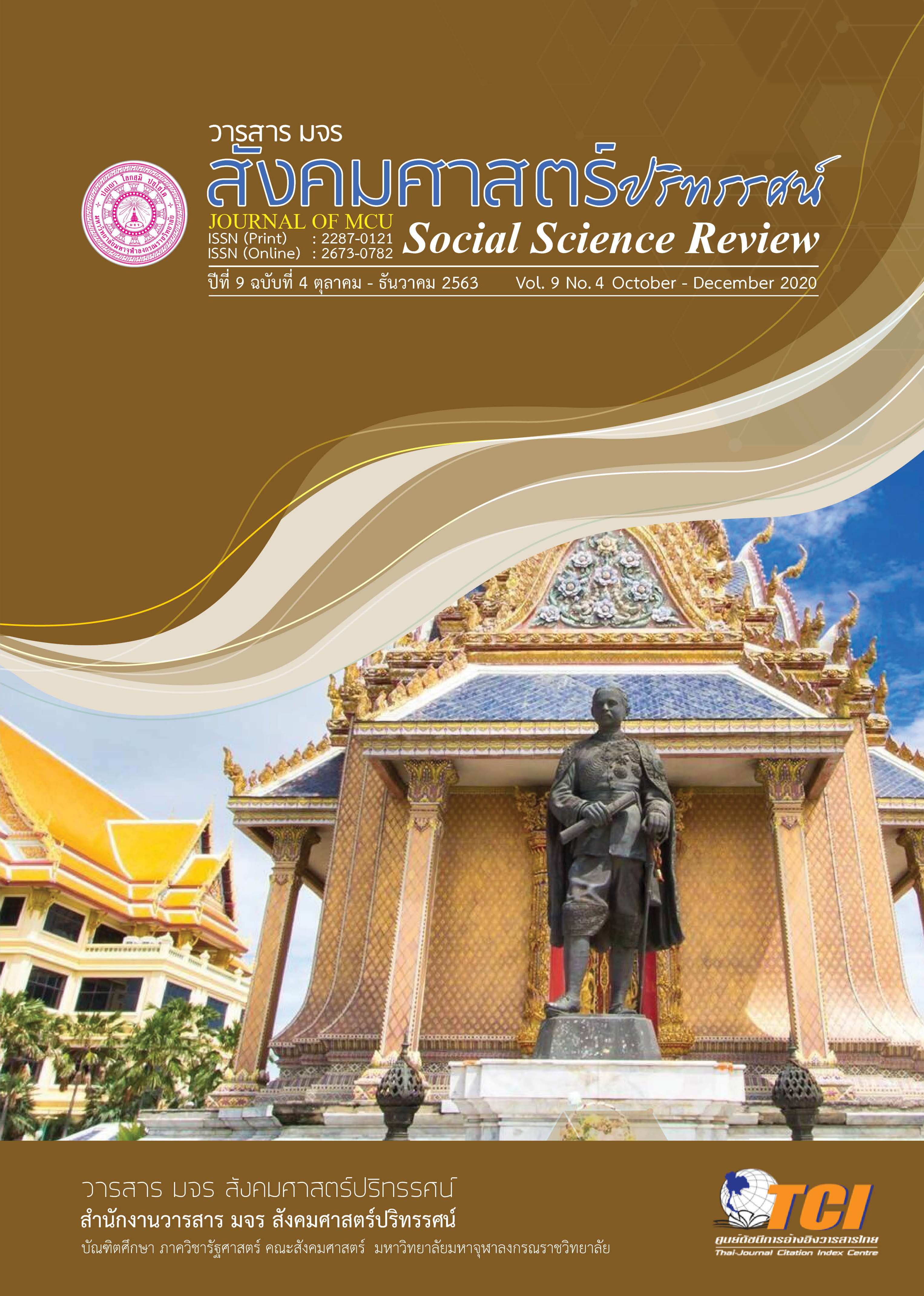อิทธิพลของการรับรู้บรรยากาศทางวิชาการที่มีต่อความผูกพันในการอ่านเชิงวิชาการในวัยรุ่นตอนปลายโดยมีเอกลักษณ์แห่งตน การรับรู้ความสามารถแห่งตนและการให้คุณค่าในการอ่านเป็นตัวแปรส่งผ่าน
คำสำคัญ:
ความผูกพันในการอ่านเชิงวิชาการ, วัยรุ่นตอนปลาย, ทฤษฎีการคาดหวังและการให้คุณค่าบทคัดย่อ
บทความวิจัยนี้มีวัตถุประสงค์เพื่อทดสอบโมเดลความสัมพันธ์เชิงสาเหตุของอิทธิพลการรับรู้บรรยากาศทางวิชาการที่มีต่อความผูกพันในการอ่านเชิงวิชาการในวัยรุ่นตอนปลายโดยมีเอกลักษณ์แห่งตน การรับรู้ความสามารถแห่งตน และการให้คุณค่าในการอ่านเป็นตัวแปรส่งผ่าน และเพื่อตรวจสอบอิทธิพลทางตรงและทางอ้อมของการรับรู้บรรยากาศทางวิชาการ กลุ่มตัวอย่าง คือ นักศึกษามหาวิทยาลัยราชภัฏเขตจังหวัดภาคกลางที่มีอายุเฉลี่ย 20 ปี จำนวน 360 คน ผู้วิจัยเก็บรวบรวมข้อมูลด้วยแบบวัดแบบรายงานตนเอง และใช้การวิเคราะห์เส้นทางในการประมาณค่าพารามิเตอร์ในโมเดลวิจัยเพื่อตอบสมมติฐานวิจัย ผลการวิจัย พบว่า โมเดลความสัมพันธ์เชิงสาเหตุความผูกพันในการอ่านเชิงวิชาการมีความสอดคล้องกลมกลืนกับข้อมูลเชิงประจักษ์ โดยการรับรู้บรรยากาศทางวิชาการ เอกลักษณ์แห่งตน การรับรู้ความสามารถแห่งตน และการให้คุณค่าในการอ่านมีอิทธิพลทางบวกต่อความผูกพันในการอ่านเชิงวิชาการ ตัวแปรในโมเดลร่วมกันอธิบายความแปรปรวนในความผูกพันในการอ่านเชิงวิชาการคิดเป็นร้อยละ 66 ผลที่ได้จากการวิจัยนี้สอดคล้องกับสมมติฐานวิจัยและเป็นไปตามตามทฤษฎีการคาดหวังและการให้คุณค่า การประยุกต์ข้อค้นพบเพื่อพัฒนาความผูกพันในการอ่านเชิงวิชาการกับกลุ่มวัยรุ่นตอนปลายจึงควรได้รับการพัฒนาต่อไป
เอกสารอ้างอิง
กระทรวงวัฒนธรรม. (2560). แผนแม่บทส่งเสริมวัฒนธรรมการอ่านสู่สังคมแห่งการเรียนรู้ของไทย พ.ศ. 2560-2564. กรุงเทพฯ: ม.ป.พ.
พนิดา ทองเงา ดอร์น. (2561). ความยึดมั่นในความเป็นพลเมืองของเยาวชนไทย : การพัฒนาเครื่องมือวัดและโปรแกรมการเรียนรู้แบบบูรณาการ (ปริญญานิพนธ์ปริญญาปรัชญาดุษฎีบัณฑิต สาขาวิชาจิตวิทยาประยุกต์). กรุงเทพฯ: มหาวิทยาลัยศรีนครินทรวิโรฒ.
รัชนีกูล ภิญโญภานุวัฒน์. (2560). ปัจจัยเชิงสาเหตุของการรู้หนังสือและความสามารถในการอ่านเพื่อรองรับโลกศตวรรษที่ 21. วารสารสุโขทัยธรรมาธิราช, 30(2), 21-35.
ละมัย ทุมพัฒน์. (2550). รูปแบบความสัมพันธ์เชิงสาเหตุของปัจจัยที่ส่งผลต่ออัตลักษณ์แห่งตนของนักเรียนช่วงชั้นที่ 4 โรงเรียนกีฬา สังกัดสถาบันการพลศึกษา. (ปริญญานิพนธ์ปริญญาการศึกษามหาบัณฑิต สาขาวิชาการวิจัยและสถิติทางการศึกษา). กรุงเทพฯ: มหาวิทยาลัยศรีนครินทรวิโรฒ.
สถาบันส่งเสริมการสอนวิทยาศาสตร์และเทคโนโลยี. (2562). การแถลงข่าวผลการประเมิน PISA 2018. สืบค้น 18 กันยายน 2563, จาก https://pisathailand.ipst.ac.th
สำนักงานสภานโยบายการอุดมศึกษา วิทยาศาสตร์ วิจัยและนวัตกรรมแห่งชาติ. (2562). บทวิเคราะห์ อันดับขีดความสามารถในการแข่งขันของประเทศไทยด้านโครงสร้างพื้นฐานทางวิทยาศาสตร์และด้านการศึกษา ประจำปี 2562 จากรายงาน IMD World Competitiveness Yearbook 2019. สืบค้น 18 กันยายน 2563, จาก http://stiic.sti.or.th/work/
สำนักงานอุทยานการเรียนรู้. (2562). เข็มสำรวจปรากฏการณ์และความเปลี่ยนแปลง 10 ปีทศวรรษแห่งการอ่าน พ.ศ. 2552-2561. กรุงเทพฯ: สำนักงานอุทยานการเรียนรู้.
สิทธิพงศ์ วัฒนานนท์สกุลและคณะ. (2562). ผลของโปรแกรมส่งเสริมการกำกับตนเองและการรับรู้ความสามารถของตน ที่มีต่อการเสริมสร้างความเข้าใจในการอ่านภาษาอังกฤษของนักเรียนชั้นประถมศึกษา. วารสารวิจัยและพัฒนาหลักสูตร, 9(2), 308-328.
สิทธิพงศ์ วัฒนานนท์สกุล. (2555). การพัฒนาและตรวจสอบคุณภาพมาตรวัดการควบคุมตนเอง : การศึกษาแยกภาวะสันนิษฐาน. วารสารศรีนครินทรวิโรฒวิจัยและพัฒนา สาขามนุษยศาสตร์และสังคมศาสตร์, 4(8), 153-167.
________. (2558). การพัฒนาทักษะการเรียนรู้โดยการเป็นผู้เรียนแบบรีเฟล็กทีฟ. วารสารพฤติกรรมศาสตร์เพื่อการพัฒนา, 7(1), 1-13.
________. (2560). การตรวจสอบความตรงโมเดลการวัดกลยุทธ์การกำกับตนเองในการเรียนรู้เชิงวิชาการของนักศึกษามหาวิทยาลัย. วารสารพฤติกรรมศาสตร์, 23(2), 43-60.
________. (2561). ประสิทธิผลของโปรแกรมเชิงป้องกันการสูบบุหรี่โดยเน้นโรงเรียนเป็นฐานที่มีผลต่อผลลัพธ์การรู้คิดเกี่ยวกับการสูบบุหรี่ ในนักเรียนชั้นมัธยมศึกษาตอนต้น เขตกรุงเทพมหานคร. วารสารวิจัยและพัฒนาหลักสูตร, 8(1), 193-219.
เหมันต์ พรหมสนธิ์. (2563). อิทธิพลของการรับรู้บรรยากาศทางวิชาการที่มีต่อความผูกพันในการอ่านเชิงวิชาการในวัยรุ่นตอนปลายโดยมีเอกลักษณ์แห่งตน การรับรู้ความสามารถแห่งตนและการให้คุณค่าในการอ่านเป็นตัวแปรส่งผ่าน. (ปริญญานิพนธ์ปริญญาศิลปศาตรมหาบัณฑิต สาขาวิชาจิตวิทยาพัฒนาการ). กรุงเทพฯ: มหาวิทยาลัยศรีนครินทรวิโรฒ.
Baron, R. M., & Kenny, D. A. (1986). The moderator–mediator variable distinction in social psychological research: Conceptual, strategic, and statistical considerations. Journal of Personality and Social Psychology, 51(6), 1173-1182.
Eccle, J. S. (1983). Expectancies, values and academic behaviors. In J. T. Spence (Ed.). Achievement and achievement motives. (p. 75-146). San Francisco: Freeman.
Eccles, J. S., & Wigfield, A. (2002). Motivational beliefs, values, and goals. Annual review of psychology, 53(1), 109-132.
Eccles, J. S. et al. (2015). Expectancies, values, identities, and self-regulation. In Oettingen, G. & Gollwitzer, P. Self-regulation in adolescence. (p. 30-56). NY: Cambridge University Press.
Jiang, Y. et al. (2018). An expectancy-value-cost approach in predicting adolescent students’ academic motivation and achievement. Contemporary Educational Psychology, 54, 139-152.
Lee, J. S. (2014). The relationship between student engagement and academic performance: Is it a myth or reality?. The Journal of Educational Research, 107(3), 177-185.
Li, Y. et al. (2016). The Role of Subjective Task Value in Service-Learning Engagement among Chinese College Students. Frontiers in psychology, 7(954), 1-10.
Park, S. W., & Kim, C. (2016). The effects of a virtual tutee system on academic reading engagement in a college classroom. Educational Technology Research and Development, 64(2), 195-218.
Schunk, D. H. et al. (2008). Motivation in education : theory, research, and applications (3rd ed.). Upper Saddle River, N.J.: Pearson/Merrill Prentice Hall.
Smith, C., & Ochoa, S. (2012). High school students’ emotional responses to science reading and academic reading engagement: Relationships to science achievement. Illinois: Northern Illinois University.
Wangrungkij, P. et al. (2018). Development of Indicators of Academic Engagement among Undergraduate Students. University of the Thai Chamber of Commerce Journal Humanities and Social Sciences, 38(1), 71 - 89.
Wattananonsakul, S., & Tuicomepee, A. (2014). Protective Predictors of Smoking Intention among Lower Secondary School Students in Bangkok, Thailand. Journal of Population and Social Studies [JPSS], 22(2), 158-173.
Wigfield, A., & Eccles, J. S. (2000). Expectancy–Value Theory of Achievement Motivation. Contemporary Educational Psychology, 25(1), 68-81.
Wigfield, A. et al. (2015). Development of achievement motivation and engagement. In Michael, E. et al. Handbook of child psychology and developmental science volume 3: socioemotional processes. (p. 657-700). New Jersey: John Wiley & Sons, Inc.
ดาวน์โหลด
เผยแพร่แล้ว
รูปแบบการอ้างอิง
ฉบับ
ประเภทบทความ
สัญญาอนุญาต
ลิขสิทธิ์ (c) 2020 วารสาร มจร สังคมศาสตร์ปริทรรศน์

อนุญาตภายใต้เงื่อนไข Creative Commons Attribution-NonCommercial-NoDerivatives 4.0 International License.
เพื่อให้เป็นไปตามกฎหมายลิขสิทธิ์ ผู้นิพนธ์ทุกท่านต้องลงลายมือชื่อในแบบฟอร์มใบมอบลิขสิทธิ์บทความให้แก่วารสารฯ พร้อมกับบทความต้นฉบับที่ได้แก้ไขครั้งสุดท้าย นอกจากนี้ ผู้นิพนธ์ทุกท่านต้องยืนยันว่าบทความต้นฉบับที่ส่งมาตีพิมพ์นั้น ได้ส่งมาตีพิมพ์เฉพาะในวารสาร มจร สังคมศาสตร์ปริทรรศน์ เพียงแห่งเดียวเท่านั้น หากมีการใช้ภาพหรือตารางหรือเนื้อหาอื่นๆ ของผู้นิพนธ์อื่นที่ปรากฏในสิ่งตีพิมพ์อื่นมาแล้ว ผู้นิพนธ์ต้องขออนุญาตเจ้าของลิขสิทธิ์ก่อน พร้อมทั้งแสดงหนังสือที่ได้รับการยินยอมต่อบรรณาธิการ ก่อนที่บทความจะได้รับการตีพิมพ์ หากไม่เป็นไปตามข้อกำหนดเบื้องต้น ทางวารสารจะถอดบทความของท่านออกโดยไม่มีข้อยกเว้นใดๆ ทั้งสิ้น





